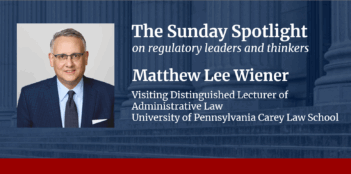
A new report to ACUS makes recommendations for how Senate-confirmed officials should participate in adjudication.
Federal agencies adjudicate millions of cases each year, including applications for government benefits, applications for licenses and permits, and enforcement actions against persons suspected of violating the law.
Much public and legal attention in recent years has focused on how these processes are structured—and particularly who within each agency has the authority to review adjudicative decisions. In part, this is because of the U.S. Supreme Court’s decision three years ago in United States v. Arthrex, which held that a statute governing the administrative adjudication of certain patent disputes was unconstitutional.
The Court concluded that the statute violated the Appointments Clause of the U.S. Constitution because it vested final, executive-branch decisional authority in the Patent Trial and Appeal Board, whose members are neither appointed by the President with the advice and consent of the Senate nor subject to at-will removal. The Court remedied the violation by holding unenforceable the statutory prohibition on the authority of a Senate-confirmed official, the Director of the U.S. Patent and Trademark Office (USPTO), to review the Board’s decisions.
Federal agencies have long grappled with issues relating to how adjudicative authority should be allocated among executive-branch officials and how agency officials who are appointed by the president and confirmed by the Senate (“PAS officials”) should direct and supervise systems of administrative adjudication. In the wake of Arthrex, not only did the USPTO develop a process for review, but other agencies—such as the U.S. Department of Labor, U.S. Department of Justice, Federal Trade Commission, and Consumer Financial Protection Bureau—have also reexamined their processes for the review of adjudicative decisions, in some cases providing for agency-head review where previously there was none.
In part as a result of Arthrex, the Administrative Conference of the United States (ACUS) undertook a project to examine how PAS officials direct and supervise agency adjudication, to gain a better understanding of when and how PAS officials participate in the adjudication of individual cases, and to identify best practices for structuring their participation.
As explained in the report we prepared for ACUS to inform the project, PAS officials have always served as adjudicators in the executive branch. The First Congress assigned the adjudication of patent applications to the Secretary of State, Secretary of War, and Attorney General, for example. And since the late 19th century , Congress has established many independent boards and commissions whose members participate regularly in the adjudication of matters arising under the regulatory programs they administer.
Still today, federal laws typically, but do not always, assign to these officials authority to adjudicate cases. Of course, the many millions of cases that federal agencies adjudicate each year far outstrip the practical capacity of the 1,200 positions that require Senate confirmation. Furthermore, there are often numerous vacancies and a relatively high rate of turnover among these positions.
Most of the everyday business of agency adjudication is performed by career civil servants, who are appointed under merit-system princples without regard to political affiliation, activity, or beliefs. Some, such as administrative law judges, are appointed by department heads. Many, including patent examiners and Veterans Benefits Administration ratings specialists, are appointed through typical federal hiring processes.
In addition to practical necessity, there are often also good policy reasons to assign decision-making authority to adjudicators who are not political appointees and to insulate non-PAS adjudicators from political control. The combination of certain functions, such as investigation, prosecution, and rulemaking, in a single decision-maker may raise concerns about the integrity of agency proceedings, and these officials may lack the specialized expertise that adjudicators who are not political appointees develop over the course of their careers.
In our research for the project, we were struck by the widely varying roles that PAS officials play in different programs. In our report to ACUS, we describe programs in which PAS officials never participate in the adjudication of individuals cases, programs in which they only occasionally participate in the adjudication of cases, and programs in which they regularly decide cases. We also describe significant variation in the procedures that PAS officials use when they serve as adjudicators.
Variation in agency practices can be explained by several factors.
First, the duties, missions, and task environments of adjudication programs differ across the executive branch. The role of PAS officials in programs with a small number of broadly consequential cases varies considerably from that of PAS officials in programs with a huge volume of cases that primarily affect only the parties themselves.
Second, the varying institutional design of adjudication programs means that PAS officials have responsibilities that differ from program to program. There are programs headed by individual PAS officials and programs headed by multimember bodies. There are programs in which the adjudication of cases is only one of many duties assigned by statute to a PAS official, and there are other programs in which adjudication forms the bulk of a PAS official’s duties.
Finally, there are a great deal of mechanisms by which PAS officials can direct and supervise adjudication programs. PAS officials may participate directly in adjudication, typically by serving as the final, executive-branch decision makers in cases arising under the statutes they administer. They also, however, establish adjudication offices and adjudicator positions, appoint and supervise adjudicators and support personnel, coordinate with the President and Congress to ensure that adjudicative subunits have the resources they need to adjudicate cases in a fair, accurate, consistent, efficient, and timely manner, establish procedural rules to structure administrative adjudication, develop substantive rules that supply the law in adjudications, and establish quality assurance systems and take actions to promote timely adjudication.
Each mechanism has its benefits and costs, and many operational and other factors determine their effectiveness in different contexts.
Variation across programs and changing legal circumstances clearly affect how PAS officials direct and supervise the programs of that the President and Senate entrust to them. In our report’s proposed best practices for the participation of PAS officials in agency adjudication we took account of such factors.
Relying on our report, ACUS adopted Recommendation 2024-3, Senate-Confirmed Officials and Administrative Adjudication, The recommendation provides policymakers with a set of principles for determining whether and when PAS officials should participate in the adjudication of cases. ACUS identified specific circumstances in which it may be beneficial for an agency to provide for review by PAS officials—for example when cases “involve legal or factual issues that are exceptionally significant or broadly consequential”—and identifies structural options for such review.
The recommendation also identifies options for selecting cases for review by PAS officials and procedures for review, including best practices for promoting impartiality and the appearance of impartiality in agency decision making.
Finally, to promote transparency, the recommendation encourages agencies to make decisions by PAS officials publicly available on their websites, adopt a presumption that oral arguments and other review proceedings before PAS officials are open to public observation, and adopt codified regulations governing all significant procedural matters pertaining to adjudication by PAS officials.
Policymakers continue to assess the role that PAS officials should play in administrative adjudication. As they consider effective mechanisms for directing and supervising varied and complex systems of administrative adjudication, Recommendation 2024-3 provides an “important and timely” statement of best practices.
The views expressed in this essay are those of the authors and do not necessarily represent the views of the Administrative Conference or the federal government.
This essay is part of a series, titled “Seeking Continuous Improvement to the Administrative Process.”






